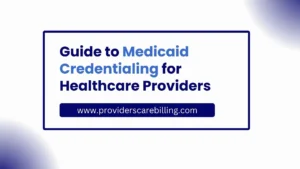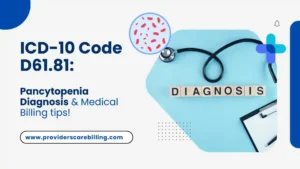In fact, billing insurance isn’t an easy task, but as a mental health counselor or therapist, you will have to make it easy. If you are thinking of just starting private practice or looking to streamline your billing process, it becomes necessary for you to understand how to bill insurance as a mental health counselor so you can get paid for your therapy services easily and on time.
To help you in this regard, our blog post will highlight every aspect of the process, from getting credentialed with insurance companies to managing payments and avoiding common billing mistakes. By the end of this guide, you will definitely have a lot of knowledge about the insurance billing process.
The Basics of Insurance Billing for Therapists
Insurance billing for therapists involves submitting claims to insurance companies in exchange for payment for the services provided. If you’re a mental health counselor, you’ll only be successful if you understand the basics of this process. That’s why we recommend understanding insurance billing to work with clients. Furthermore, you should also be familiar with each insurer’s rules and requirements.
Now, let us discuss this procedure step by step. Be with us!
Step 1: Get Credentialed with Insurance Companies
The very first step for a mental health counselor learning about billing insurance is to Credentialing services for mental health providers. In credentialing, insurance companies verify your qualifications and give you approval to be a part of their network of providers. After being credentialed, it is time to submit claims to those insurance companies for reimbursement.
Why is Credentialing Important?
Credentialing is very important because it allows you to accept insurance as payment for your services. If your credentials are incorrect, you will not be able to bill insurance for therapy sessions. In addition, credentialing makes you credible. Due to this reason, clients trust you as a certified provider.
How to Get Credentialed?
- Research Insurance Panels: Take the first step and find out which insurance companies are commonly used in your area. To us, some major insurance providers for mental health services are Aetna, Cigna, and Blue Cross Blue Shield.
- Prepare Your Documents: It is the rule of every insurance company to ask for documents such as proof of your license, professional liability insurance, and your certifications. You must have all these before applying.
- Submit Your Application: After you have chosen a reliable insurance provider with whom you will work, submit your credentialing application now. You can also do this online. The insurance company will review your qualifications and either approve or deny your application.
If they approve you, you will be listed as an in-network provider. It means you can now start billing insurance for therapy sessions. To get more information, you can check out our Credentialing Guide for Therapists.
Step 2: Verify Client Insurance Benefits
After credentialing with the insurance companies, the next step in how to bill insurance as a mental health counselor is to verify your client’s insurance benefits. This step helps you understand which services are covered, how much the client will pay out of pocket, and whether any pre-authorization is required before treatment.
Why Verify Insurance Benefits?
The verification of insurance helps you prevent billing issues later on. You will understand exactly what the client’s insurance will cover. It promises to save you from surprises when the insurance company processes the claim. When you learn how to bill insurance companies perfectly, there will be no risk of claim denials due to incorrect information.
How to Verify Insurance Benefits
- Contact the Insurance Company: To contact the client’s insurance company, you can call them directly or use online resources. For this purpose, you should have the client’s insurance ID number and other personal details on hand.
- Ask the Right Questions: When verifying benefits, your questions must include the following information:
- Types of mental health services
- Number of therapy sessions in a year
- Pre-authorization requirements
- Out-of-network benefits, etc.
- Document Everything: As proof, try to keep a record of your conversation with the insurance company. Also, ask for the representative’s name and the details of the coverage. It will avoid confusion in the future.
ByGuide to verifying insurance eligibility for therapists, you are now completely prepared to submit a claim that is accurate and aligned with the client’s coverage.
Step 3: Submit Claims Accurately
The third step is to submit your claims accurately. Keep in mind that submitting accurate claims is the most important part of the therapy billing process. Here, any errors will result in denied claims and delayed payments.
How to Bill Insurance for Therapy?
- Use Billing Software: Now, many billing software programs are available. Such tools help you complete the necessary claim forms, ensuring all required information is included. They also track the status of your claims.
- Fill Out the CMS-1500 Form: The Manual system of claim submission is not common nowadays. But if you are doing so, you will fill out the CMS-1500 form with the following sections:
- Patient’s personal information
- Therapy services provided
- Diagnosis code
- Your details as the provider
- Double-Check the Information: Do not take “accuracy” lightly when submitting insurance claims. So, double-check all the above information to make your claim error-free. It means the more accurate your claim, the faster it will be processed.
- Submit Claims Electronically: You should always try to submit your claims electronically. The reason is that electronic claims are processed faster than manual ones and have a lower error rate than paper claims.
This step will not only streamline your claims process but also increase the chances of getting paid immediately.
Step 4: Manage Payments and EOBs (Explanation of Benefits)
When your claim is submitted, you will now move on to monitor the payments and track the Explanation of Benefits (EOBs). An EOB is actually a statement that the insurance company provides to explain how the claim was processed, how much will be paid to you, and how much the client is responsible for.
Managing Payments
- Review the EOB: This document contains the payment amount, the services to be provided, and any remaining patient responsibilities. So, you must review this EOB file carefully to make sure that everything is accurate.
- Track Payments: This is the most crucial step to keep track of the payments you receive from insurance companies. It usually takes 2 to 4 weeks to process, according to the payer and the claim type.
- Handle Denials: What if your claim is denied? Do not worry at all. Just go and check the reason behind the denial. In case of a simple error, such as an incorrect code, just correct it and resubmit your claim. But if there is any complex denial, you will file an appeal.
When you manage payments and EOBs efficiently, your smooth revenue cycle will be strong, and you will stay on top of your financial health.
Paying for insurance on therapy sessions in a private practice situation has its own challenges and considerations. Even though the fundamental principles remain unchanged, therapists in private practice often have other responsibilities. That’s why it’s essential to learn how to bill insurance as a mental health counselor so you can understand the complete insurance billing procedure and receive proper payments at the right time.
This article will take you through the main processes of how to bill insurance as a private practice therapist. We shall also highlight the pitfalls to avoid and how Providers Care Billing LLC can make your billing easier.
Common Mistakes Therapists Make When Billing Insurance
Billing insurance is so difficult that experienced therapists make mistakes and face denials or delayed payments. We will explain these mistakes and their solutions as well.
1. Incorrect CPT Codes
The usage of wrong CPT codes is the most prominent mistake that many therapists make during billing insurance. CPT codes describe the services provided, but when not used properly, they can result in the claim being rejected. Always pay special care to the codes for accuracy before submitting.
2. Incomplete Documentation
Incomplete documentation or missing information always leads to claims denial. The CMS-1500 form contains many sections of your important information. So, be sure to fill out this form carefully and correctly.
3. Failure to Verify Benefits
Failing to verify benefits is also a common mistake. If you do not verify benefits, you will not be able to deal with issues like coverage limits, co-pays, etc. It is advisable to verify coverage before the due date so that there will be no billing issues ahead.
4. Late Submission of Claims
Late submissions will result in claims being denied. Therefore, you must submit claims promptly after the service is provided. Most insurance companies have strict deadlines for claims submission. If you miss them, you will definitely get delayed payments.
Simplify Your Insurance Billing Process with Providers Care Billing LLC
It is somewhat overwhelming to handle insurance billing in private practice, but it shouldn’t be this way. With the right tools and support, you can simplify the process and ensure that you get timely payments. This is where Providers Care Billing LLC becomes a necessity.
At Providers Care Billing LLC, we have much experience in insurance billing for mental health providers. We offer end-to-end services that can help private practice therapists to make their billing process easier. Our team expertly handles everything from the first to the last step of this process.
Our Services Include:
- Credentialing with Insurance Companies: We help you get credentialed with multiple insurance providers so you can accept a wide range of insurance plans.
- Verifying Client Insurance Benefits: We ensure that your clients’ benefits are verified accurately so you can avoid future billing surprises.
- Submitting Claims Accurately: Our team submits your claims correctly and on time without any risk of denials.
- Managing EOBs and Payments: We keep an eye on payments and review Explanation of Benefits (EOBs) so that claims are paid according to your expectations.
- Denial management and Appeals: In the event of a Claim denial management, we pursue the appeal process and work with insurance companies to resolve issues quickly.
By joining hands with Providers Care Billing LLC, you can focus on what you do best, that is, providing quality care to your clients. Because here, we take care of the therapy billing process for you. So, never let the complexity of insurance billing for therapists slow you down. Contact us today to enjoy all our wonderful services and learn more about how we can simplify your billing process. Contact Providers Care Billing LLC
FAQS:
Q1. How do mental health counselors bill insurance for therapy sessions?
A: The mental health counselors bill insurance for therapy sessions by submitting claims with the right CPT codes, verification of patient benefits, and credentialing with insurance panels prior to filing the claims.
Q2. Do I need to be credentialed to bill insurance as a therapist?
A: Yes! You must be credentialed with your desired insurance company. It is because the verification of your qualifications and getting reimbursement timely and adequately is not possible without being credentialed.
Q3. How can I bill insurance for therapy in a private practice?
A: There are different steps that need to be followed to bill insurance for therapy in a private practice. These include verifying coverage, using proper billing software, submitting claims electronically, and following up on denials or unpaid claims.
Q4. What CPT codes are commonly used for therapy billing?
A: There are different CPT codes that are used for therapy billing. But CPT codes 90791 for an initial evaluation, 90834 for a 45-minute therapy session, and 90837 for a 60-minute session are widely used in this regard.
Q5. How long does it take to get paid after billing insurance?
A: The time to get paid after billing insurance is different for different clients. Normally, the payment process takes about 2 to 4 weeks. But it depends on the payer’s situation and claims.
Q6. Can I bill insurance without being credentialed?
A: No, it is not possible to bill insurance without being credentialed. However, you may use a superbill to submit for potential reimbursement.
Q7. What’s the difference between insurance billing and credentialing?
A: Credentialing is only the process of getting approval from insurance panels. On the other hand, billing is a process that starts after credentialing. It also involves claim submission and payment tracking.
Q8. Which software helps therapists with insurance billing?
A: Many software options are available nowadays. Out of these, tools like TheraNest, SimplePractice, or TherapyNotes are more reliable due to their error-free billing and insurance services.
Q9. Why are my insurance claims getting denied?
A: Claims denial is not due to any one reason. There are many reasons in the background, such as wrong CPT codes, incomplete documents, expired authorizations, or billing without credentialing approval.
Q10. How can Providers Care Billing LLC help with insurance billing?
A: We offer remarkable mental health billing services that include all the steps, like credentialing, claim submission, denial management, and payment posting. In this way, we make therapists get paid faster.
Q11. How to accept insurance as a counselor?
A: As a counselor, you can accept insurance when you get credentialed with insurance companies. You will also be required to sign contracts and use billing software. All these will help you to submit claims for reimbursement.
Q12. Do mental health counselors take insurance?
A: Yes, many mental health counselors take insurance, but the condition is to be credentialed and enrolled with insurance panels such as Aetna, Cigna, Blue Cross, etc.
Q13. How to submit a therapy bill to insurance?
A: Therapists can submit a therapy bill through filing CMS-1500 claim forms or electronic claims. It is done through billing software using the correct CPT codes and patient details.
Q14. How do therapists get paid by insurance?
A: Therapists get payments after the approval of insurance claims. Such payments are sent directly via EFT or by check after 2 to 4 weeks of submission.
Q15. Can a licensed mental health counselor bill insurance?
A: Yes, licensed mental health counselors (LMHCs) have high authority to bill insurance once credentialed and verified with each payer they plan to work with.





